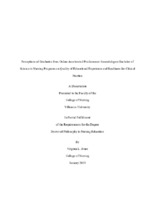Perceptions of graduates from online accelerated pre-licensure second-degree bachelor of science in nursing programs on quality of educational experience and readiness for clinical practice
View File(s)
Visitor Statistics
Visits vs Downloads
Visitors - World Map
Top Visiting Countries
| Country | Visits |
|---|
Top Visiting Cities
| City | Visits |
|---|
Visits (last 6 months)
Downloads (last 6 months)
Popular Works for Jones, Virginia L. by View
| Title | Page Views |
|---|
Popular Works for Jones, Virginia L. by Download
| Title | Downloads |
|---|
View Citations
Citations
There is an increasing use of distance learning methods being utilized for nursing education. Accelerated second-degree Bachelor of Science in nursing (ASDBSN) programs have increased rapidly from 31 in 1990 to 230 in 2013 with 33 more programs in the planning stages according to the American Association of Colleges of Nursing (2013). There are currently three identified online pre-licensure, ASDBSN programs. There are research studies focusing on graduates from this type of nursing programs using the traditional format, which is the face-to-face college experience, but a lack of literature regarding graduates of the online learning format. This qualitative descriptive study explored recent graduates' perceptions from two online ASDBSN programs related to quality of their educational experience and their preparation for clinical practice. Individual interviews were conducted with eleven recent graduates, all practicing registered nurses, in an online HIPPA protected video/audio conference room. This study's findings indicated that all participants felt they received a quality education. In addition, the participants felt they graduated from quality programs. The study also found that recent graduates of online ASDBSN programs expressed confidence and verbalized being well prepared for clinical practice, which is different from what is reported in the literature for typical graduates of traditional programs.
This dissertation has also been disseminated through the ProQuest Dissertations and Theses database. Dissertation/thesis number: 3686608; ProQuest document ID: 1667058702. The author still retains copyright.
This item has not gone through this repository's peer-review process, but has been accepted by the indicated university or college in partial fulfillment of the requirements for the specified degree.
| Type | Dissertation |
| Acquisition | Proxy-submission |
| Review Type | None: Degree-based Submission |
| Format | Text-based Document |
| Evidence Level | Descriptive/Correlational |
| Research Approach | Qualitative Research |
| Keywords | Distance Learning; Bachelor's Degree Nurses; Quality of Education |
| CINAHL Subject(s) | Education, Non-Traditional; Education, Nursing; New Graduates; Nurse Attitudes |
| Grantor | Villanova University |
| Advisor | Copel, Linda |
| Level | PhD |
| Year | 2015 |
All rights reserved by the author(s) and/or publisher(s) listed in this item record unless relinquished in whole or part by a rights notation or a Creative Commons License present in this item record.
All permission requests should be directed accordingly and not to the Sigma Repository.
All submitting authors or publishers have affirmed that when using material in their work where they do not own copyright, they have obtained permission of the copyright holder prior to submission and the rights holder has been acknowledged as necessary.
Related items
Showing items related by title, author, creator and subjects.
-
National Council Licensure Examination for Registered Nurses (NCLEX-RN®) success: Perceptions of accelerated second-degree Bachelor of Science in nursing students
Brzoza, Vicki L.Most of the 50 states in the United States (U.S.) will experience a significant nursing shortage by the year 2030. Research finds that a bachelor of science in nursing (BSN) workforce is associated with better outcomes, ... -
Accelerated but effective: The clinical competency of second-degree accelerated bachelor of science in nursing students
Kidd, Susan Etheridge; Martin, Jeanne E.; Swift, Alison D.Using a non-descriptive comparative approach, the authors investigated the clinical competence between Second-Degree ABSN and BSN students. The Creighton Competency Evaluation Instrument was used to measure clinical ... -
Informing andragogy: Voices of graduates from accelerated, second-degree programs in nursing concerning faculty teaching practices
Hanson-Zalot, Mary E. (2018-03-15)This study examined accelerated, second-degree prelicensure baccalaureate graduates’ perceptions of andragogical practices employed by faculty that prepared students best to begin practice as entry-level nurses. An ... -
The relationship between selected variables and the National Council Licensure Examination for Registered Nurses: A comparative analysis of pass/fail performance for traditional and second-degree baccalaureate students
Englert, Nadine CozzoThis retrospective study was conducted to examine the relationship between selected variables and performance on the National Council Licensure Examination for Registered Nurses (NCLEX-RN). Data were collected from one ... -
Implementation and evaluation of home health simulation to improve pre-licensure bachelor of science nursing students' learning: An action research study
Kollowa, Kathryn (2016-03-17)Session presented on Friday, July 24, 2015: This action based research study used a descriptive triangulation process,which included quantitative and qualitative methods for competency skills in regards to nursing students' ...





